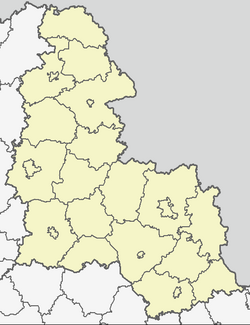Nedryhayliv
|
Nedryhailiv Недригайлів Недригайлов |
||
|---|---|---|
| Town | ||

One of the city's central intersections
|
||
|
||
| Location of Nedryhayliv on a map of Ukraine. | ||
| Coordinates: 50°50′5″N 33°52′37″E / 50.83472°N 33.87694°ECoordinates: 50°50′5″N 33°52′37″E / 50.83472°N 33.87694°E | ||
| Country |
|
|
| Oblast |
|
|
| Raion | Nedryhaylivskyi Raion | |
| Founded | 1639 | |
| Elevation | 129 m (423 ft) | |
| Population (2001 census) | ||
| • Total | 6,198 | |
| Time zone | EET (UTC+2) | |
| • Summer (DST) | EEST (UTC+3) | |
| Postal code | 42100 | |
| Area code(s) | +380 5455 | |
| Website | Verkhovna Rada of Ukraine | |
Nedryhailiv (Ukrainian: Недригайлів; Russian: Недригайлов) is an urban-type settlement situated on the Sula River in Sumy Oblast of northeastern Ukraine. It serves as the administrative center of the Nedryhailiv Raion (district), housing the raion's administrative structure. Population: 5,596 (2015 est.)
According to the official regional history, on the territory of the modern-day Nedryhayliv district were settlements formed during the late Paleolithic Era (as early as 15,000 years ago), lasting through the Bronze Age and into early Iron Age. In addition to these settlements, archaeologists discovered evidence of the Chernyakhov and Maryanivska cultures, Kurgan burial grounds of the Scythian era, and remains of a settlement of the early Slavs from the first centuries A.D.
The area in the region was populated by Severian settlers during the Kievan Rus' period. Archaeological excavations in 1972 during Soviet rule in Ukraine uncovered artifacts from this period, including early Slavic pottery, a beaded necklace, and remnants of metallic weaponry. It is likely that the ancient settlement of Nedryhayliv ceased to exist after the Mongolian-Tatar Invasion of 1239. The area is believed to have remained uninhabited for almost three centuries afterward. With time, this land became part of the Grand Duchy of Lithuania, and from the year 1569, the western part of Nedryhaylivskyi Raion broke off to the Partitions of the Polish-Lithuanian Commonwealth, where it stayed until 1647. The eastern and southeastern parts of the raion joined the Grand Duchy of Moscow, also known as Muscovy.
...
Wikipedia


